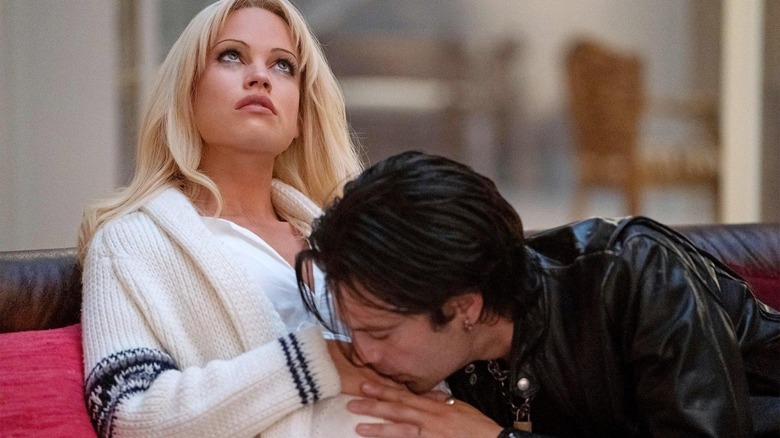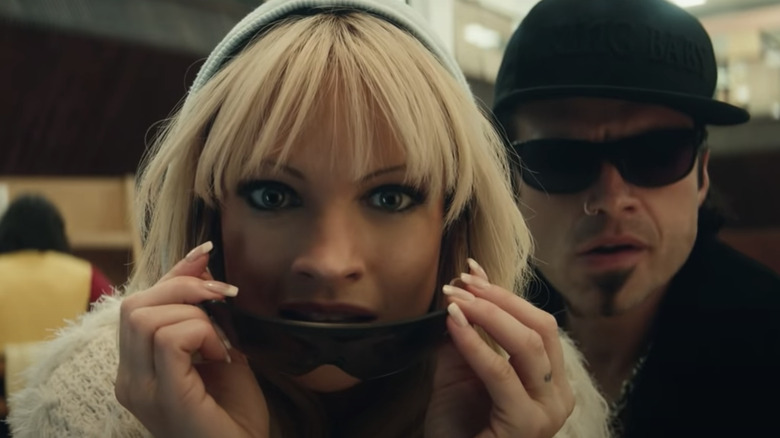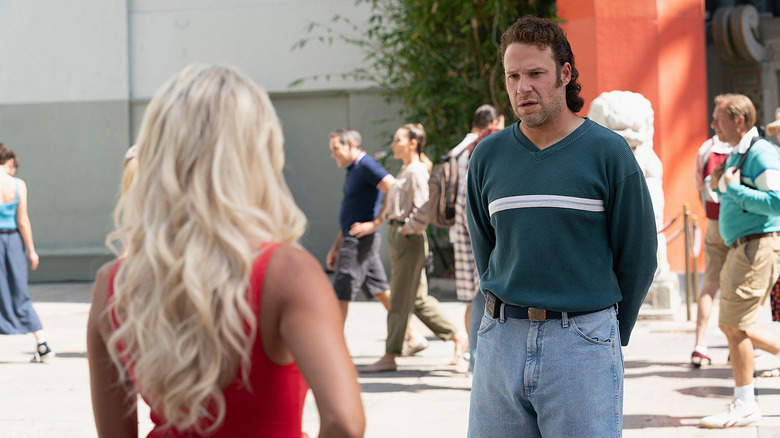Pam And Tommy Ending Explained: The Victims Of Voyeurism
The true story of the world's first viral video and the couple who inadvertently starred in it is a complicated one that almost seems too wild to be believed. Hulu's limited series "Pam & Tommy" sets out to try and make sense of the mayhem, providing a more sympathetic look at Pamela Anderson (Lily James) and Tommy Lee (Sebastian Stan) than the media or pop culture ever did. The 1990s were a time of notoriously trashy media scandals that invaded famous people's privacy and demonized women for simply existing, meaning that doing the story justice also means a careful tightrope walk to avoid slipping into outright exploitation. "Pam & Tommy" is both fantastic and frustrating, a lesson in how our parasocial relationships with celebrities can destroy careers, marriages, and even lives. Made without input from Anderson or Lee, the series can only address so much, leaving some viewers upset with the romanticized version of the pair's marriage, which exploded much more violently than is ever depicted onscreen.
The one message that "Pam & Tommy" clearly communicates is that voyeurism can truly hurt people, even if they're rich and famous. It practically begs us to challenge our own desire to peek into the private lives of total strangers and shames the culture that encourages such leering, invasive behavior. It's a bold move for a series that has itself been called invasive and makes the series finale all the more potent.
Spoilers for the finale of "Pam & Tommy" from here on out!
Holding a mirror to ourselves
There is a moment in "Pam & Tommy," around the middle of the season, where the couple sees their private images on a website for the first time. The camera is focused squarely on their faces as if they're looking straight through the computer screen and at us, yet another set of voyeurs invading their lives. We've witnessed their whirlwind romance and have had impossible access, just like everyone who watched their sex tape back in the '90s did. While many of the episodes force us to examine our roles as active viewers of spectacle, they also deliver so much spectacle to latch onto that it's almost hypocritical. Is it possible for a series to be critical of something that it is also doing? The final episode of "Pam & Tommy" doesn't wrap things up in a neat little bow, instead making viewers sit with the fact that the real story doesn't have a happy ending.
The finale depicts one last vacation for the star-crossed couple, a chance to try to fix their marriage after the stresses of fame, parenthood, and having their peace of mind shattered all irrevocably changed it. The series ends after Anderson leaves the vacation early, driving herself back home after she overhears Lee joking about the sex tape at the bar. He's trying to process it in his own way, but it hurts her to hear him being so flippant. We then get the standard true story end-text, with a series of postscripts explaining what happened to everyone next. Lee's jail stint for spousal abuse is just a footnote, and the series' most egregious fault is painting him a little too sympathetically, giving credence to his rock star legacy without bringing up the ugliest details.
No one gets closure
The finale of "Pam & Tommy" is uncomfortable and deeply tragic. Their marriage may not have worked out regardless of what happened, but it's undeniable that the release of their private sex tape caused a serious rift between the pop-culture power couple. The man responsible for their agony, Rand Gauthier (Seth Rogen), tries desperately to apologize to Pam, to find some way to get closure and feel better about what he's done. In the end, he talks to a street performer on the Hollywood Walk of Fame dressed as Anderson, but that doesn't quite give him the release from the guilt that he clearly needs. Gauthier's story serves as the viewer's introduction into the scandalous, salacious world of '90s Hollywood, and he ends up becoming the audience's stand-in. We — as a society and as individuals — owe Pamela Anderson an apology.
Anderson has spoken out against the series, feeling re-victimized by having her voice taken from her yet again. In its final episode, the creatives behind the series dodge the fact that maybe they, too, owe Anderson an apology. In the end, no one gets closure: not Anderson, or Lee, or Gauthier, and certainly not us.
If you expected to feel better about how everything shook out at the end of "Pam & Tommy," the ending might have been a rude awakening. It's uncomfortable, and it should be, because it's just another form of voyeurism without consent, regardless of how slick and stylish it looks. If Anderson can't have closure, we sure as hell don't deserve any.
The finale of "Pam & Tommy" is now streaming on Hulu.


